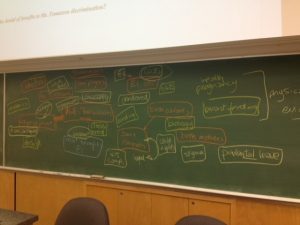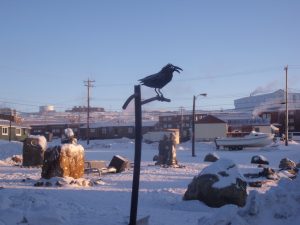This is a guest blog post and photos from Gillian Calder, who has been an instructor in Legal Process since 2004. She is a Professor here at UVic Law, presently serving as the Acting Chair in Gender Studies for the 2023-2024 year.

The first course that all incoming students at UVic Law take is Law 106: Legal Process. The course is at the heart of the founding vision of the law school, embracing the idea of legal process as law-in-action, meaning law as it is lived in legal institutions, on the land and in the streets.[1] This idea of law as a process animates the course, but is also a central component of UVic Law’s broader ethos; one which emphasizes experiential learning — in the classroom and beyond — alongside a rich and expansive academic program.
Serving as both orientation and an introduction to law, Legal Process is unique in Canadian law schools, and part of the reason that UVic is known across the country as an innovator in legal education. Since its first iteration in 1975, almost every law professor who has taught at UVic has been part of the course – either in content delivery, as a classroom guest, or as a contributor to the materials.
Legal Process is a two-week intensive course that starts the first Tuesday of term and ends the following Friday; with a brief return to the classroom to reconnect and reflect in January. All 1Ls in the JD and the JD/JID programs are divided into six groups of around 25 students, with two or three professors (and often a graduate student) assigned to each group. In our first-year program it is one of the places that JD and JD/JID students share the classroom and learn together. Throughout the September part of the course, students meet in small group and large group sessions, inside and at times outside the law school, working collaboratively with teachings that address two themes – first, that the legal system is best understood as a dynamic process; and second, that the primary responsibility for a holistic legal education rests on students.
These central themes get taken up in a host of challenging and at times embodied ways, each addressing a series of competencies that students will hone over their three or four years at UVic Law. Students are introduced to a variety of legal topics throughout these two weeks, utilizing unique and innovative methodologies that ensure the materials are consistently engaging, challenging, and surprising. Some Legal Process sessions include: an introduction to Indigenous legal orders through the graphic novel Mikomosis and the Wetiko;[2] a dispute resolution simulation exercise; a multi-class examination of the evolution of the common law of product liability, engaging themes of access to justice, trauma-informed practice, legal theories, and case analysis; and introductions to practices of citizenship, freedom and wellness (to name just a few). The course materials and offerings are always evolving, and no two years of Legal Process are ever exactly alike.

While Legal Process introduces students to a vast array of legal concepts and ideas, the course has objectives intended to ground that learning, enabling students to begin to see the way that the development of knowledge, skills, values and attitudes will shape their engagement with law throughout their careers. Some of these objectives include:
- the development of a collegial and inclusive learning environment. Legal Process is a space where some of the hardest questions we can ask ourselves about Canadian society are discussed, interrogated and thought through with peers and professors;
- exploration of the idea that people shape the law, in addition to being shaped by it. This includes in the paths of their own legal learning;
- engagement with various skills and ways of knowing crucial to legal learning and practice. These include self-reflection, reasoning, ethical practice, emotional literacy, and critical writing; and
- fostering capacity for questioning. This is achieved through differing methodologies of analysis (including, visual, electronic, on the land, and case-based), and in light of differing legal traditions (common law, civil law, Indigenous, international and transnational) that make up our global communities today.
The materials for Legal Process include a course book, a shared online platform, a series of guest speakers, and some law on the land components that have in the past included a guided walk on PKOLS (the local mountain), and a place-based learning series that takes students on a legal “tour” of downtown Victoria. All of these elements are designed to enable an introduction to law as a process, setting the groundwork for the courses that JD and JD/JID students will commence in their third week of term and continue for the rest of the academic year. And while Pass/Fail over the years we have been guided in the delivery and evaluation of the course by the words of our colleague, Dr Tracey Lindberg on teaching: “You have the right to make kind mistakes. You will make mistakes and it is your responsibility to be as informed as possible when you get to class in order that your mistake is kind.”[3]
Students will find that their instructors are deeply committed to Legal Process (almost annoyingly so), in all its unique elements. I have, for example, been a classroom instructor since 2004, the course director for a three-year stint, and I have contributed some of the pedagogies that have shaped Legal Process over the years. One year I even taught a version of the course to 12 Inuit students in Iqaluit! What I have seen are moments of passion, curiosity, rigour and delight as students work closely and intensively with their instructors and with small groups of their classmates over the first two weeks of law school, setting the stage in meaningful and unexpected ways for the year, program, and career to come.

[1] https://www.uvic.ca/news/topics/2015+40th-anniversary-of-uvic-law+ring.
[2] https://www.youtube.com/watch?v=iAy4vmq3z2s&list=PL76jl_4AtHOxBWcPm-mtQuplNEUAR4dwl&index=1&t=135s
[3] https://www.cbc.ca/radio/q/post-show-notes-shad-s-week-seven-highlights-1.3106456.